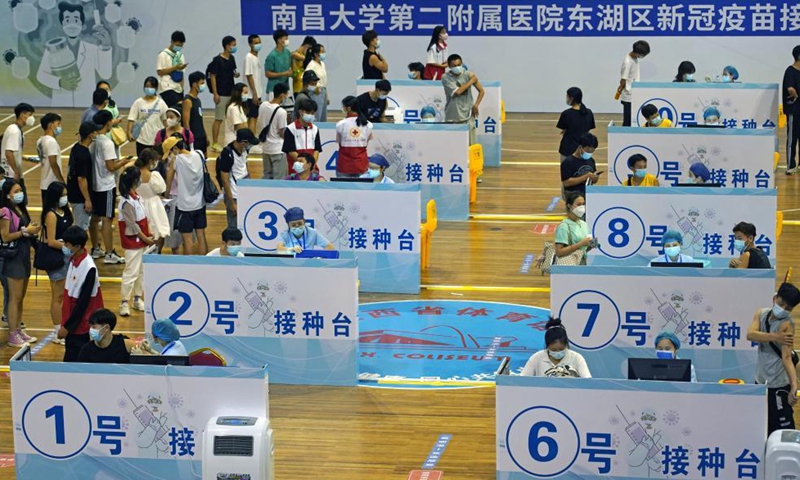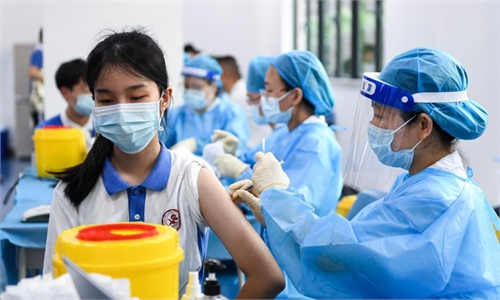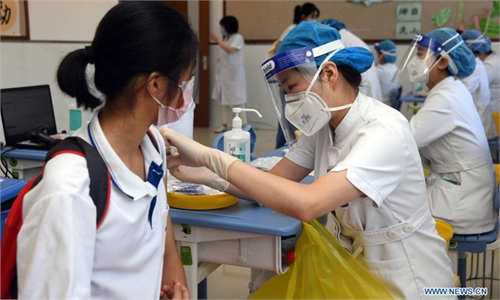China accelerates vaccination drive in rural areas with free pick-ups, vaccine vehicles, door-to-door visits
China accelerates vaccination drive in rural areas with free pick-ups, vaccine vehicles, door-to-door visit

Medical workers administer COVID-19 vaccines to college students in Nanchang, capital of east China's Jiangxi Province, June 4, 2021. Photo: Xinhua
Free pick-ups, mobile vaccination sites and door-to-door visits…Chinese cities are ramping up efforts to accelerate the vaccination drive by rolling out measures to help inoculation and ease access for people who are willing to get COVID-19 jabs, even in rural and mountainous areas.
Officials in Changfeng village of Southwest China's Sichuan Province are arranging free pick-up service for the convenience of senior people in the mountainous village, a staffer of the township government, surnamed Wan, told the Global Times on Wednesday.
"Most of those old people are alone at home, and we also prepared some medicine for heat stroke in the buses for the elderly," the official said. In early August, more than 70 people aged 60 and above in Changfeng village received vaccines with the help of the township government staff, who organized three buses to pick them up from the mountainous village and take them to the vaccination center 10 kilometers away.
Such cases are not unique. Hunan Province's Shenzhou has also provided personnel to pick up villagers for inoculation for free. Vaccination sites also prolonged the working hours until 10 pm for public convenience. Guangdong Province's Taishan city even arranged mobile vaccination vehicles to drive into rural villages and communities.
In order to ensure that residents living in the remote mountainous areas of Tibet Autonomous Region have better knowledge about and access to vaccines, some officials have spared no effort to visit locals door to door.
With the help of officials who tramp over hills and dales covering more than 400 kilometers every day to promote vaccines in Tibet's Zuogong county, more than 30,000 people out of 50,000 have had their first shots.
The Global Times learned that the inoculation drive in Northwest China's Xinjiang Uygur Autonomous Region has also been going smoothly. Local residents, despite living in border areas, have access to vaccines as vaccination sites have been installed in clinics of villages and counties. Some communities even organize medical staffers to visit and inoculate elderly people who have difficulty in walking.
However, as China accelerates its vaccination drive, some local governments have taken a one-size-fits-all policy and some have rolled out extreme policies.
Media reports said at least two districts in Southwest China's Chongqing released a notice last week saying that if people aged above 18 with no contraindications refuse to receive vaccines without a reason, they could be registered into the social credit system.
The National Health Commission has repeatedly stressed that China encourages voluntary COVID-19 vaccinations, and works to ensure all people eligible for vaccination have access to it.
Xue Lan, a professor and former dean at the School of Public Policy and Management of Tsinghua University in Beijing, told the Global Times on Wednesday that deviation from central policies are acts of individual local governments, which doesn't mean the country has shifted its inoculation policy from voluntary to compulsory.
Pressured with the goal of reaching herd immunity and reducing the chance of epidemic flare-ups, some local governments interpret this as a "rigid target" that they must complete. Some even take it as a chance to "flaunt their achievement," and some adopt a one-size-fits-all policy just to ensure public safety, Xue said.
Xue said "we must admit many reasons are behind the situation. We must understand the pressure that local governments have in the vaccination drive, but it doesn't provide any reason to force people to receive inoculation.
"Local governments should find better ways to prompt vaccination, such as by listing concrete data and stories to tell people why their inoculation is important."
As of Tuesday, China had administered more than 1.975 billion doses of COVID-19 vaccines.
China's top epidemiologist Zhong Nanshan said that China needs to vaccinate about 83 percent of its population to achieve herd immunity. Zhong said China has administered the most vaccine doses in the world, but the proportion of vaccination per 100 people is not high due to the large population.




